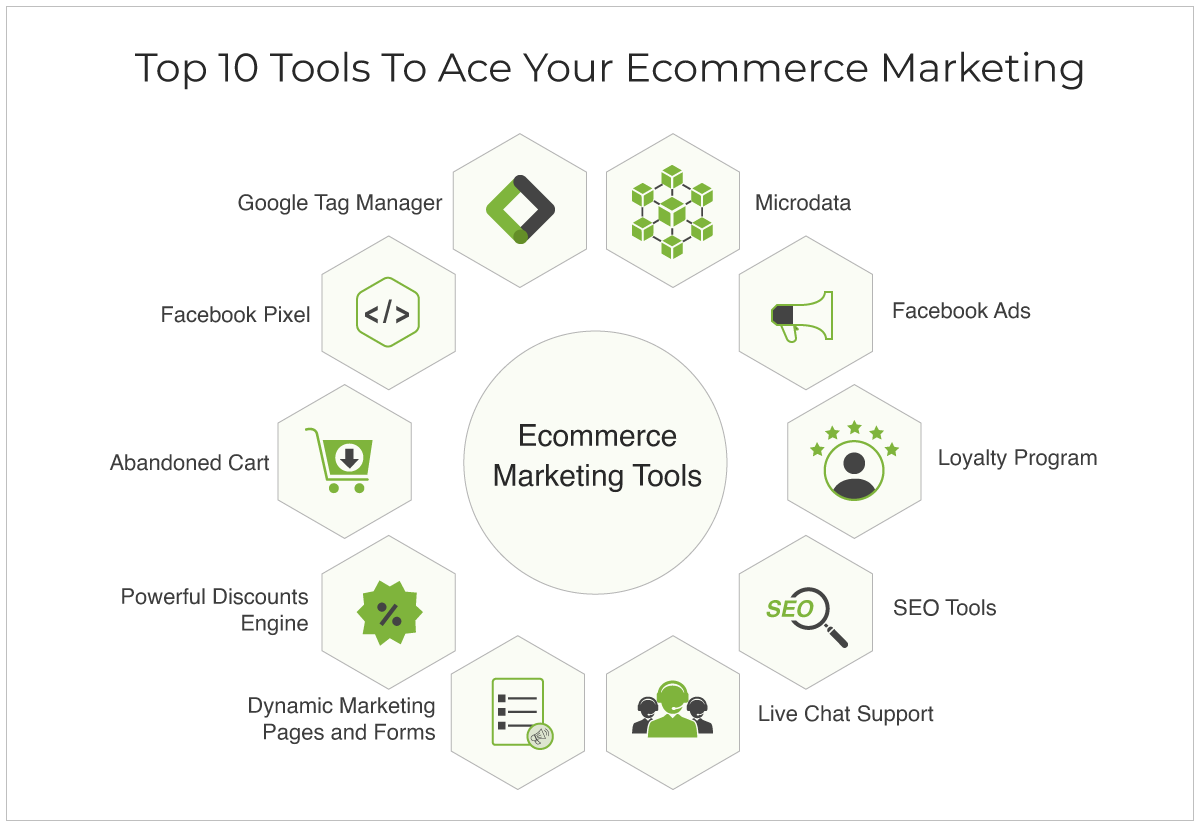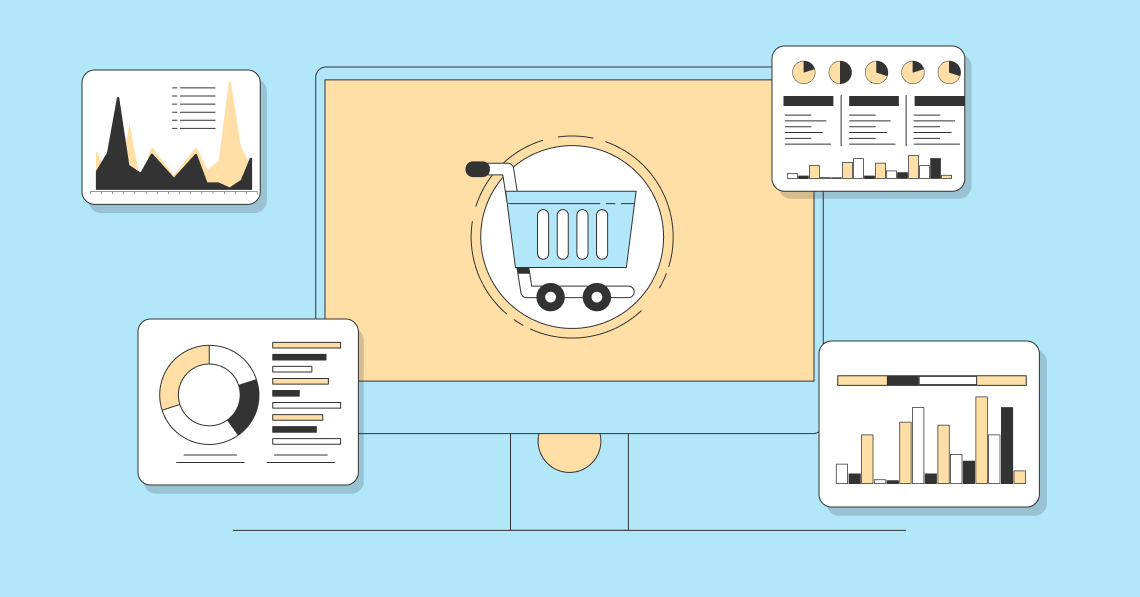Ecommerce Marketing Tools: Essential Picks for Success
Ecommerce marketing tools help businesses enhance online visibility and drive sales. They streamline tasks like SEO, email marketing, and social media management.
In today’s competitive landscape, effective ecommerce marketing tools are essential for success. These tools not only simplify marketing efforts but also provide valuable insights into customer behavior. From optimizing website traffic to automating email campaigns, they cater to various aspects of online selling.
Businesses can track performance metrics, engage customers, and refine strategies based on real-time data. As ecommerce continues to grow, leveraging the right tools becomes crucial for staying ahead. Understanding the diverse range of available tools empowers businesses to make informed decisions and enhance their marketing strategies effectively. Investing in these resources can significantly impact overall profitability and customer satisfaction.
Essential Ecommerce Marketing Tools
Effective ecommerce marketing relies on the right tools. These tools help boost visibility, increase sales, and enhance customer engagement. Here are some essential ecommerce marketing tools to consider.
Seo Optimization Platforms
SEO optimization is crucial for driving organic traffic. These platforms help improve your website’s search engine ranking.
- Google Analytics: Track website performance and user behavior.
- Ahrefs: Analyze backlinks and keyword rankings.
- SEMrush: Conduct keyword research and competitor analysis.
- Yoast SEO: Optimize content for search engines on WordPress.
Using these tools can improve your site’s visibility. Here’s a quick comparison of features:
| Tool | Features |
|---|---|
| Google Analytics | Website traffic tracking, user demographics |
| Ahrefs | Backlink analysis, keyword explorer |
| SEMrush | SEO audits, content optimization |
| Yoast SEO | On-page SEO guidance, readability analysis |
Email Marketing Software
Email marketing remains a powerful tool. It helps nurture leads and retain customers. Here are some popular email marketing software options:
- Mailchimp: User-friendly with automation features.
- Constant Contact: Great for small businesses with templates.
- SendinBlue: Offers SMS marketing and email campaigns.
- ConvertKit: Ideal for bloggers and creators.
These platforms simplify creating and sending emails. Here’s a breakdown of their main features:
| Software | Main Features |
|---|---|
| Mailchimp | Automation, segmentation, analytics |
| Constant Contact | Customizable templates, list management |
| SendinBlue | Email campaigns, SMS marketing |
| ConvertKit | Landing pages, email funnels |
Choose the right tools for your ecommerce needs. They can significantly enhance your marketing efforts and drive growth.

Credit: blog.adnabu.com
Maximizing Social Media Impact
Social media plays a crucial role in eCommerce marketing. Businesses can reach millions of potential customers through effective strategies. Using the right tools helps brands boost their presence online.
Social Scheduling Tools
Social scheduling tools help businesses plan and post content efficiently. These tools ensure consistent engagement with the audience. Here are some popular social scheduling tools:
| Tool Name | Key Features | Best For |
|---|---|---|
| Hootsuite | Multiple accounts, Analytics, Custom reports | Large teams |
| Buffer | Easy scheduling, User-friendly, Analytics | Small businesses |
| Later | Visual planning, Instagram focus, Linkin.bio | Instagram marketers |
Using these tools saves time and improves content strategy. Schedule posts during peak engagement times. Analyze performance to adjust future content. This method maximizes visibility and engagement.
Influencer Partnership Platforms
Influencer marketing drives significant traffic and sales. Partnering with the right influencers boosts brand awareness. Here are some effective platforms to find influencers:
- AspireIQ: Connects brands with influencers based on audience.
- Upfluence: Offers a vast database for influencer searches.
- Influencity: Provides analytics and campaign management.
Choose influencers who align with your brand values. Focus on those with genuine engagement. Collaborate on unique content. This strategy will enhance your brand’s reach on social media.
Leveraging Data Analytics
Data analytics is a game-changer for eCommerce businesses. It transforms raw data into actionable insights. Businesses can understand customer behavior better. This leads to smarter marketing strategies and increased sales.
Customer Data Platforms
Customer Data Platforms (CDPs) collect and manage customer information. They help businesses create a unified customer profile. This profile contains data from different sources. It allows businesses to tailor marketing efforts more effectively.
- Centralized Data: All customer data in one place.
- Improved Segmentation: Create targeted marketing campaigns.
- Enhanced Personalization: Deliver personalized experiences to customers.
Popular CDPs include:
| CDP Name | Key Feature |
|---|---|
| Segment | Real-time customer data collection |
| BlueConic | Customer journey mapping |
| Tealium | Data integration across channels |
Conversion Rate Optimization Tools
Conversion Rate Optimization (CRO) tools enhance website performance. They help convert visitors into customers. Using these tools can significantly boost sales.
- A/B Testing: Compare two versions of a web page.
- Heatmaps: Visualize where users click on your site.
- Form Analytics: Optimize forms to increase submissions.
Top CRO tools include:
- Optimizely: Easy A/B testing interface.
- Hotjar: Provides heatmaps and session recordings.
- Crazy Egg: Offers visual reports on user behavior.

Credit: www.storehippo.com
Enhancing Customer Experience
Enhancing customer experience is essential for eCommerce success. Happy customers return and recommend your brand. Using the right tools can help you engage customers effectively. Let’s explore two powerful tools: chatbots and personalization engines.
Chatbots For Real-time Engagement
Chatbots improve customer engagement instantly. They answer questions, resolve issues, and guide users. Here are some benefits of using chatbots:
- 24/7 Availability: Customers can get help anytime.
- Instant Responses: No waiting for human agents.
- Cost-Effective: Reduce staffing costs significantly.
- Data Collection: Gather insights on customer preferences.
Chatbots can be programmed for various tasks:
- Answer FAQs.
- Assist in product searches.
- Handle returns and exchanges.
Using chatbots creates a seamless shopping experience. Customers feel valued and understood.
Personalization Engines
Personalization engines tailor the shopping experience for each customer. They analyze customer data to provide relevant recommendations. Benefits include:
| Benefit | Description |
|---|---|
| Increased Sales: | Personalized offers lead to higher conversion rates. |
| Customer Loyalty: | Customers appreciate personalized experiences. |
| Better Engagement: | Relevant content keeps customers interested. |
Implementing personalization engines is simple:
- Collect customer data.
- Analyze shopping behavior.
- Deliver personalized recommendations.
Personalization enhances the overall shopping journey. Customers feel special and understood.
Streamlining Operations And Fulfillment
Efficient operations and fulfillment boost customer satisfaction. E-commerce businesses thrive on speed and accuracy. Using the right tools simplifies these processes. This section explores key tools for managing inventory and shipping.
Inventory Management Systems
Inventory management systems help track stock levels. They prevent overstocking and stockouts. Here are some key benefits:
- Real-time tracking: Monitor stock levels instantly.
- Automated alerts: Get notifications for low stock.
- Data insights: Analyze sales trends effectively.
Popular inventory management tools include:
| Tool Name | Main Features | Price Range |
|---|---|---|
| TradeGecko | Multi-channel support, stock tracking | $39 – $249/month |
| Skubana | Order management, analytics | Custom pricing |
| Zoho Inventory | Inventory tracking, order management | Free – $259/month |
Shipping And Tracking Solutions
Shipping and tracking solutions enhance delivery efficiency. They improve customer communication and satisfaction. Key features include:
- Automated shipping labels: Save time on label creation.
- Real-time tracking: Provide updates to customers.
- Multiple carrier options: Choose the best shipping method.
Top shipping solutions are:
| Solution Name | Main Features | Price Range |
|---|---|---|
| ShipStation | Label printing, order management | $9 – $159/month |
| Easyship | Global shipping, cost calculator | Free – Custom pricing |
| Shippo | Shipping rates, tracking | Free – $10/month |

Credit: influencermarketinghub.com
Frequently Asked Questions
What Are Ecommerce Marketing Tools?
Ecommerce marketing tools help businesses promote their online stores, manage campaigns, and analyze performance to boost sales.
Why Use Ecommerce Marketing Tools?
These tools streamline marketing efforts, enhance customer engagement, and provide valuable insights for optimizing sales strategies.
Which Ecommerce Marketing Tools Are The Best?
Top tools include Google Analytics, Mailchimp, Hootsuite, Shopify, and SEMrush for comprehensive marketing management.
How Do Ecommerce Marketing Tools Improve Sales?
They automate processes, target specific audiences, analyze data, and optimize campaigns, leading to increased conversions and revenue.
Can I Use Ecommerce Marketing Tools For Free?
Many ecommerce marketing tools offer free versions or trials, allowing businesses to explore features before committing to paid plans.
Conclusion
Choosing the right ecommerce marketing tools can significantly impact your business growth. These tools streamline your efforts, making tasks easier and more effective. Invest time in researching options that fit your needs. With the right tools, you can enhance customer engagement and drive sales, paving the way for long-term success.
